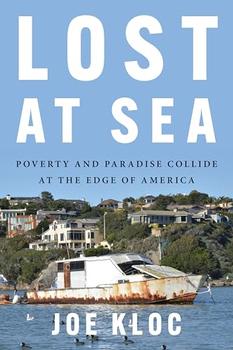
Poverty and Paradise Collide at the Edge of America
by Joe Kloc
A deeply personal nine-year account of the lives of the "anchor-outs"—an unhoused community living off the California coast on abandoned boats—that explores the struggles and resilience of those surviving on the fringes of society.
In the wake of the financial crisis, the number of anchor-outs living in Richardson Bay more than doubles as their long-simmering feud with the wealthy residents of Marin County—one of the richest counties in the country—finally boils over. Many of the shoreline's well-heeled yacht club members and mansion owners blame their unhoused neighbors for rising crime on the waterfront. Meanwhile, local politicians accuse them of destroying the Bay Area's marine ecosystem and demand their eviction. When the pandemic breaks out, a slew of city and regional authorities heed the call: they seize and crush the anchor-outs' boats, arresting dissenters as they dismantle one of the nation's oldest unhoused communities.
Kloc's near-decade-long firsthand account of the joys, hardships, and eventual demise of the anchor-outs is in many ways the story of being poor in America. Examining the profit-driven policies that exacerbate the contemporary housing crisis, Lost at Sea weaves together tales of comradery and survival on the anchorage with the rich history of the region, from the creation of unspeakable wealth during the San Francisco Gold Rush era to the aftermath of the devastating earthquake and fire of 1906, when the first unhoused people dropped their anchors in Marin County.
Along the way, Kloc discovers the quiet beauty of the world the anchor-outs built: how they've learned to care for each other, band together to fend off real estate developers and NIMBY neighbors, and fight for a way of life that is entirely unrecognizable to those on shore. Lost at Sea explores the often overlooked world of poverty and homelessness that exists in even the wealthiest enclaves of America, where people who have fallen on hard times struggle to rebuild their lives among those who would rather just wish them away.
"Enthralling…[Kloc] offers vivid portraits of the charming and welcoming anchor-outs themselves…without shying away from reporting on the community's endemic violence and poverty. It's an evocative portrait of America at the fringes." —Publishers Weekly (starred review)
"A magisterial but unsentimental journey." —Kirkus Reviews
"The depth of Joe Kloc's reporting made me understand the history of California's anchor-outs and the stakes of their fight against their millionaire neighbors and their local government. The vividness of his writing, meanwhile, made me care deeply about his characters—the pensioners, street preachers, and hemp farmers whose lives on the edges of our society are too often left out of stories about wealthy areas like the Bay Area." —Megan Greenwell, author of Bad Company: Private Equity and the Death of the American Dream
"An absorbing chronicle of inequality in America. Kloc is a great writer and his careful attention to compelling details of place and speech—and to the rhythm of days and nights spent floating on the water—will make you feel like you're bobbing on the bay with his characters through the last days of their outcast community." —Anthony McCann, author of Shadowlands: Fear and Freedom at the Oregon Standoff
This information about Lost at Sea was first featured
in "The BookBrowse Review" - BookBrowse's membership magazine, and in our weekly "Publishing This Week" newsletter. Publication information is for the USA, and (unless stated otherwise) represents the first print edition. The reviews are necessarily limited to those that were available to us ahead of publication. If you are the publisher or author and feel that they do not properly reflect the range of media opinion now available, send us a message with the mainstream reviews that you would like to see added.
Any "Author Information" displayed below reflects the author's biography at the time this particular book was published.
Joe Kloc is a reporter and senior editor at Harper's Magazine, where he was a finalist for the 2019 National Magazine Award for Feature Writing. His work has also appeared in the New York Times Magazine, The Guardian, New York magazine, and the The New York Review of Books.
The third-rate mind is only happy when it is thinking with the majority. The second-rate mind is only happy when it...
Click Here to find out who said this, as well as discovering other famous literary quotes!
Your guide toexceptional books
BookBrowse seeks out and recommends the best in contemporary fiction and nonfiction—books that not only engage and entertain but also deepen our understanding of ourselves and the world around us.